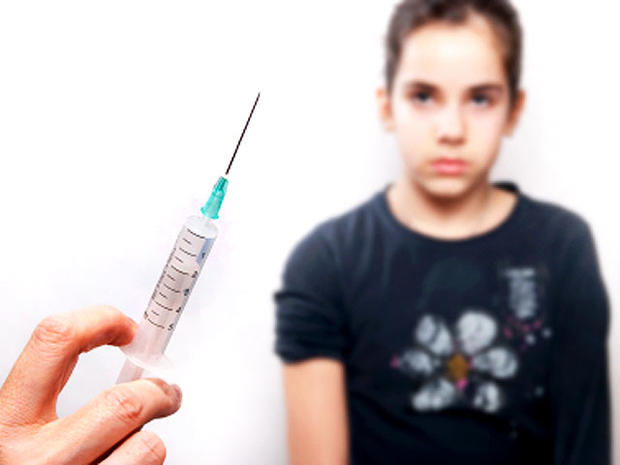More than 1 in 10 parents reject recommended vaccines
(CBS/AP) How can parents protect their kids against potentially deadly diseases?
PICTURES - 10 deadly myths about childhood vaccines
By giving them at least two dozen separate doses of vaccines against 14 diseases by the time their kids turn 6, says the U.S. government.
But a new survey found more than 1 in 10 parents go a different route, refusing the recommended vaccine schedule because of safety concerns.
That means more than 2 million infants and young children may not be fully protected against preventable and potentially deadly diseases. Even parents whose kids were fully vaccinated admitted worrying about vaccine safety: 1 in 5 among that group said they think delaying shots is safer than following the recommended schedule.
The survey - published online in the October 3 issue of Pediatrics - was in line with another survey released last month, showing that at least 1 in 10 toddlers and preschoolers lagged on vaccines that included chickenpox and the measles-mumps-rubella shots.
Besides the survey, other news has raised concerns among infectious disease specialists. One recent study showed the whooping cough vaccine seems to lose much of its effectiveness after just three years - faster than doctors have thought - possibly contributing to recent outbreaks, most notably in California. Data reported in September also show that a record number of Calif. kindergartners' parents last year used a personal belief exemption to avoid vaccination requirements.
Kandace O'Neill - a Lakeville, Minn., mom - says her 5-year-old son has had no vaccinations since he turned 1, and her 7-month-old daughter has received none of the recommended shots.
"I have to make sure that my child is healthy, and I do not want to put medications in my child that I think are going to harm them," said O'Neill, who was not involved in the survey.
O'Neill said she's not an extreme anti-vaccine zealot. She just thinks that parents - not doctors or schools - should make medical decisions for their children.
Vaccine skepticism is fueled by false information online and media reports that sensationalize misconceptions, said study author Dr. Amanda Dempsey, professor of pediatrics and communicable diseases at the University of Michigan. Some parents, for example, believe that there is a link between autism and vaccination, despite scientific evidence to the contrary. Some parents also dismiss the severity of vaccine-preventable diseases because they've never seen a child seriously ill with those illnesses.
But vaccine-preventable diseases such as flu and whooping cough can be deadly, especially for infants, said Dr. Buddy Creech, associate director of vaccine research at Vanderbilt University.. Creech has two school-aged children who are fully vaccinated and a newborn he said will be given all the recommended vaccinations.
"From being someone in the trenches seeing children die every year from influenza and its complications ... I would not do a single thing to risk the health of my kids," he said.
Dr. Larry Pickering, an infectious disease specialist at the CDC said he supports the idea of parents being actively involved in medical care for their children, but had a message of caution: "If they're going to do that, they need to be fully informed about the risks and benefits of vaccines and need to obtain the information from a valid source."
The American Academy of Pediatrics has more on vaccines.

